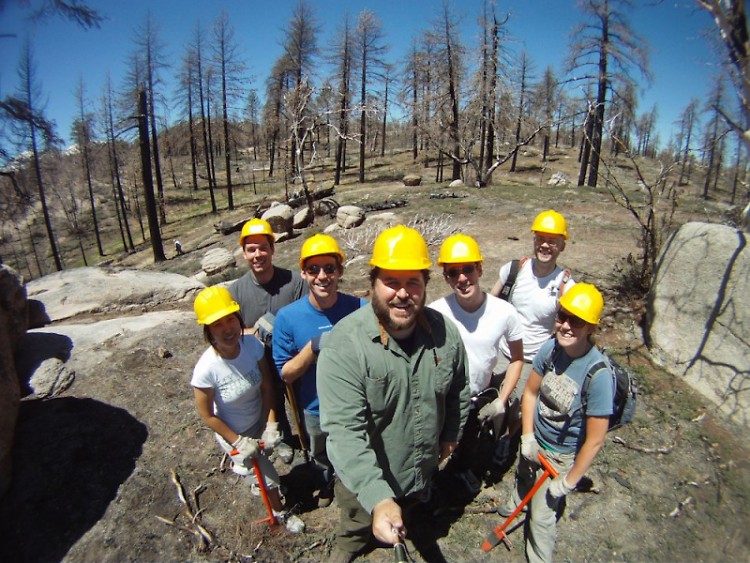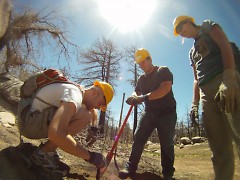“I like to live closely to the philosophy of ‘take nothing but pictures, leave nothing but footprints.'"
~ Lindsay Sagorski, MSU graduate and former resident of Grand Rapids,
now a Senior Civil Engineering Assistant in Los Angeles, CA
“Going green” is the hip thing to do these days. Even here in Grand Rapids, businesses, schools and homes are recycling more, educating themselves, and, if they continue in their efforts and spread the word, hopefully setting themselves on the track to a brighter future.
The book, “Moral Ground: Ethical Action for a Planet in Peril,” shows us that many believe that human beings have more than a scientific and economic obligation to preserve our planet. They believe we have a moral obligation as well. More than eighty world leaders contribute to the content of “Moral Ground.” The editors of the book, Kathleen Dean Moore and Michael Nelson, are traveling across the country to town halls everywhere, inviting communities to meet and discuss how they feel about preserving the planet and what we can do.
On October 26, Grand Rapids is hosting a Moral Ground Town Hall Meeting, focused on one question: Do we, as human beings, have a moral or ethical responsibility to preserve the planet for future generations?
“Yes, I believe we do,” answered Lindsay Sagorski, Senior Civil Engineering Assistant for the Los Angeles County Department of Public Works. “I understand that humans have grown accustomed to certain luxuries in life that don't necessarily mesh well with the natural landscape…however, we have a responsibility to pass on a planet that people can live in for years to come.”
Sagorski, a graduate of MSU, grew up in Grand Rapids, where her family still lives. She now resides in Redondo Beach, California, where she has lived for about three years. “California as a whole is pretty progressive in environmental law and conservation,” she said. “Overall, I feel like sustainability is a pretty high priority for many in the LA area just as it is a growing issue throughout the United States.
Sagorski tries to do her duty to help preserve the Earth for future generations. “I've worked on various landfill and Material Recovery Facility (MRF) projects in the Environmental Programs Division [at work],” she said. “In the Watershed Management Division, I worked on a few water retention projects -- ways to capture storm water and infiltrate it into our water tables. Also, we planted native plants along our flood control facilities.”
At home, she participates in city recycling programs, walks or rides public transportation whenever possible (although this might have something to do with LA’s insane highways), and has volunteered with TreePeople, an environmental non-profit that started in the 1970s. Their mission is to “inspire, engage and support people to take personal responsibility for the urban environment,” according to their website. One of TreePeople’s central goals is to expand the tree canopy over Los Angeles, and they strive to start the use of certain technologies, like permeable paving, to cool the city.
“This is one of my favorite non-profs,” Sagorski said. “They don't really have a political agenda, they just want to do as much good as they can with what we've been handed.” She volunteered in mountain reforestation projects with TreePeople, replanting trees in burn areas to jump start reforestation.
“I like to live closely to the philosophy of ‘take nothing but pictures, leave nothing but footprints,’” she said. “It…is obviously impossible, everyone creates waste. But it’s a good mantra.”
Sagorski believes that, in general, humans are heading in the right direction when it comes to sustainability and environmentalism, and that we should continue expanding the green movement and learning new ways to preserve our planet and increase sustainability.
“It's not going to be easy but I do believe that there are ways [to repair the damage we have caused] and we have already come a long way. The history of environmentalism is not very long.”
“Humans have already caused much damage to the planet,” she continued. “So right now, we are dealing with the dilemma of changing ‘how we do business,’ if you will, and also cleaning up the gigantic mess we have already created.”
Maybe if everyone could donate just a little of their time to reducing waste -- recycling, reusing, replanting, and renewing resources, this world will have a chance.
Disclosure: Lindsay Sagorski is a friend of the author.
The Rapidian, a program of the 501(c)3 nonprofit Community Media Center, relies on the community’s support to help cover the cost of training reporters and publishing content.
We need your help.
If each of our readers and content creators who values this community platform help support its creation and maintenance, The Rapidian can continue to educate and facilitate a conversation around issues for years to come.
Please support The Rapidian and make a contribution today.


